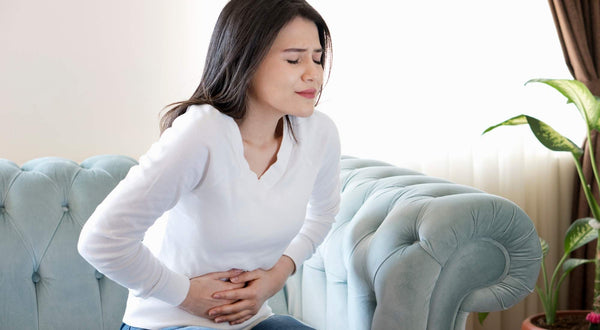Is Endometriosis Fatal?: Understanding Your Diagnosis and Prognosis
You’re experiencing symptoms like pain during sex, heavy bleeding during and between your menstrual cycles, and trouble conceiving.
You’ve heard of endometriosis before and believe your symptoms match the common disease.
Millions of questions begin to run through your head.
But the biggest one: Can endometriosis be life-threatening?
This guide will help you to understand the causes and symptoms of endometriosis while talking you through a variety of methods to help manage the painful disease.
Table of Contents
- What is Endometriosis?
- What Causes Endometriosis?
- What are the Symptoms of Endometriosis?
- Can Endometriosis Be Fatal?
- What Happens if Endometriosis Goes Untreated?
- 3 Medical Treatment Options for Endometriosis
- 3 Steps To Managing Your Endometriosis Symptoms Naturally
- Is Endometriosis Deadly?: The Bottom Line
What is Endometriosis?
When tissue similar to the tissue that lines the uterus begins to grow outside of the uterus, a woman is suffering from a common inflammatory disease known as endometriosis.
Most often, the tissue begins to grow on the:
- Ovaries
- Fallopian tubes
- Tissues that hold the uterus in place
What Causes Endometriosis?
Unfortunately for the 1 in 10 women who suffer from endometriosis, there is no known cause of the inflammatory disease.
While there have been many theories, most scientists believe that the cause of endometriosis may be a combination of many factors.
Endometriosis does have a genetic disposition which makes some women more likely to get it than others.
If a first, second, or third-degree family member suffers from endometriosis, you are not guaranteed to suffer from the inflammatory disease as well.
However, if you begin to experience symptoms, you should seek medical attention for a diagnosis.

What are the Symptoms of Endometriosis?
If you are experiencing symptoms of endometriosis, know that you are not alone.
This painful inflammatory disease equally affects women across all racial, ethnic, and socioeconomic backgrounds who are in their prime reproductive years.
For endometriosis sufferers, the pain could be so severe that it affects their lives in more ways than one.
Most commonly, women with endometriosis feel intense pelvic pain during their menstrual cycle.
You might be saying, “I experience cramping during my periods and I don’t have endometriosis.”, which may be true.
However, women with endometriosis describe this menstrual pain as far worse than normal and say it increases over time.
Other common signs and symptoms of endometriosis could include:
- Painful sex
- Pain when using the bathroom
- Heavy menstrual periods
- Infertility
- Experiencing fatigue, nausea, diarrhea, constipation, or bloating during your menstrual cycles
To be diagnosed with endometriosis, women experiencing these symptoms should get a definitive diagnosis via a laparoscopy procedure.
To help relieve some of these painful symptoms, Chiavaye has created natural products that help make day-to-day life more bearable.
Can Endometriosis Be Fatal?
You’ve determined that you are experiencing some of the symptoms that identify as endometriosis. Now you find yourself worrying about what the rest of your life might look like.
Can endometriosis be fatal?
Is endometriosis treatable?
How do I go about my daily life with this pain?
Many newly-diagnosed women worry that endometriosis is life-threatening, and thankfully, it is not.
While endometriosis isn’t known to kill, some complications of the inflammatory disease can cause potentially life-threatening problems.
What Happens if Endometriosis Goes Untreated?
There is no cure for endometriosis.
But there are treatments to help control and manage it.
If the symptoms of endometriosis are ignored, serious and life-threatening complications are possible.
Most commonly, when left untreated, women with endometriosis experience:
- Infertility
- Intense and debilitating pelvic pain
- Ovarian cysts and adhesions
- Problems using the bathroom
- Pelvic infections
- Possible higher risk of ovarian cancer

3 Medical Treatment Options for Endometriosis
Although there is no known cure for endometriosis, women can live a comfortable life by keeping the painful symptoms at bay.
Three popular treatment options for endometriosis sufferers include:
- Medicinal
- Hormone therapy
- Surgery
It is important to note that although these are the three most common medical treatment options for endometriosis, they may not work for everyone.
Additionally, these treatments could have serious side effects.
It is crucial to talk all of these options over with your medical provider before moving forward with treatment.
Aside from medicine, hormone therapy, or surgery, Chiavaye creates natural products that help women with endometriosis combat symptoms like painful sex and female dryness.
#1 Medications
Women with endometriosis who don’t suffer from severe symptoms are often recommended to take a simple pain reliever, like ibuprofen or naproxen, to help manage symptoms.
These two drugs are NSAIDs (non-steroidal anti-inflammatory drugs) and can be purchased over-the-counter.
If the endometriosis symptoms are too painful for these common pain relievers to help, prescription medicine might be recommended by your doctor.
#2 Hormone Therapy
Heavy menstrual bleeding is a symptom of endometriosis, and hormone therapy can help.
However, hormone therapy oftentimes has many side effects, including:
- Weight gain
- Depression
- Body hair growth
- Irregular bleeding
- Acne
Common hormone therapy options include:
- Birth control (pill, patches, vaginal rings)
- Progestin-only contraceptives (pill, shots, IUD)
#3 Surgery
If endometriosis pain and symptoms cannot be managed by medication or hormone therapy, surgery should be a last resort option.
Surgery, big or small, will require a recovery period and may have serious side effects or drawbacks. You should make yourself aware of the recovery and long-term effects of each surgical procedure before moving forward with surgery.
You might be a good candidate for endometriosis surgery if:
- Your pelvic pain is too severe and medications aren’t enough to get the symptoms under control.
- You are having trouble getting pregnant.
- You have a growth in your pelvic area to remove.
Three surgery options include:
- Laparoscopy - A laparoscopy can both diagnose and treat endometriosis by cutting a small incision in your abdomen and inflating your stomach with gas before inserting a camera and light inside. Once inside, the doctor can remove the tissue.
This outpatient surgery is generally quick and can take as little as 30 minutes.
Side effects and recovery might include:
- Tiredness
- No driving
- No sex
- No swimming or baths
- Laparotomy - This is a major surgery that is an option if a laparoscopy cannot treat the endometriosis symptoms.
A large cut through your abdomen skin and muscle allows doctors to remove the affected tissue.
This usually requires at least one night in the hospital.
Recovery will likely be more painful than laparoscopy and last several weeks.
- Hysterectomy - A hysterectomy is the most major surgery that endometriosis sufferers might undergo. It requires removing your uterus (and maybe more of your reproductive organs) if it has been damaged or affected by the endometriosis tissue. This will cause you to go into menopause.
Side effects might include:
- Hot flashes
- Loss of bone density
- Female dryness
3 Steps To Managing Your Endometriosis Symptoms Naturally
Medications and surgery are not always the answers to managing your endometriosis symptoms.
We now know what happens if endometriosis goes untreated, so your symptoms should not be ignored.
However, there are numerous ways you can gain control of your endometriosis symptoms using natural remedies, including:
- Diet
- Supplements and Herbal Remedies
- Exercise

#1 Diet and Nutrition
If you’re looking to manage your endometriosis symptoms more naturally, your diet could be the first place to look.
Scientific studies have proven that a positive change in diet can reduce inflammation, reduce pain associated with endometriosis, and specifically reduce pelvic pain symptoms.
A low glycemic anti-inflammatory diet may help to manage your endometriosis symptoms.
You could try:
- Increasing Omega-3 fats
- Avoiding trans fats
- Eating fruits, vegetables, and whole grains
- Eliminating gluten, soy, and dairy
- Limiting caffeine and alcohol
#2 Supplements and Herbal Remedies
The use of certain herbs and supplements may allow women with endometriosis to experience relief from their painful symptoms.
Some common supplements women try include:
- Probiotics
- Vitamin B6
- Milk thistle
- EPA and DHA Oil
- N-Acetylcysteine (NAC)
- Magnesium
- Turmeric
#3 Physical Exercise
Physical exercise has a positive effect on women with endometriosis.
Evidence suggests that women who exercise regularly can protect themselves from the severe symptoms caused by inflammatory diseases.
One study shows how women with endometriosis who exercise regularly had a reduction in the size of endometriotic lesions.
With this evidence, it is possible to suggest that physical exercise might be beneficial to women with endometriosis, a painful inflammatory disease.
If you’re one of the many women who suffer from endometriosis, you know that the disease can affect many areas of your life.
An endometriosis support group can help connect you to other women who live a similar life as you.
If you’re looking to connect with others, talk about your experience, and learn more information, seek a support group online or in your area.
You might be surprised to learn that being a part of a community can help manage some of your symptoms.
Is Endometriosis Deadly?: The Bottom Line
You find yourself suffering from the following symptoms:
- Intense pelvic pain
- Heavy menstrual bleeding
- Bleeding between menstrual cycles
- Painful intercourse
- Fatigue, nausea, diarrhea
- Trouble conceiving
- And more
Although there is no known cure for endometriosis, the bottom line is this: when properly managed, the disease itself is not deadly.
However, complications from the side effects of endometriosis can cause life-threatening problems.
When treated quickly, endometriosis symptoms can be drastically reduced.
Chiavaye offers natural products to help ease some of the symptoms, like painful sex and female dryness, for women suffering with endometriosis.
Find out how Chiavaye can help eliminate some of your endometriosis symptoms today.


